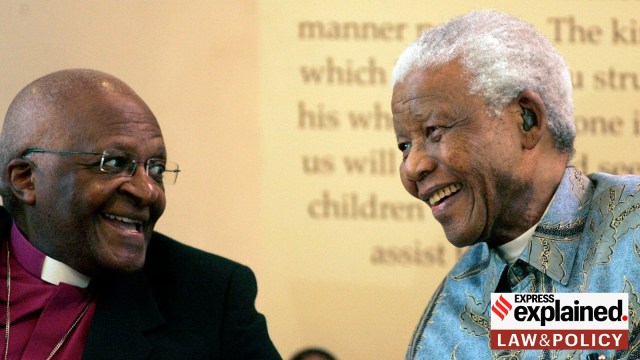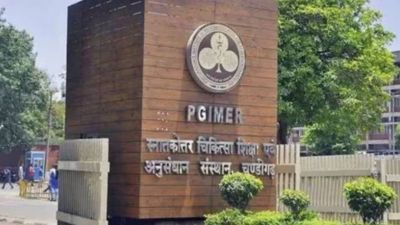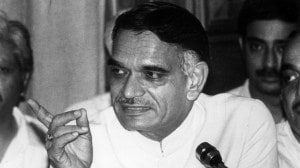SC upholds Article 370 abrogation: What is Truth and Reconciliation Commission?
Justice Sanjay Kaul, in his opinion, recommended the setting up of a Truth and Reconciliation Commission in Jammu and Kashmir. What will the purpose of such a commission be? Which countries have had such commissions in the past?
 Authorised by Nelson Mandela (right) and chaired by Desmond Tutu, South Africa's Truth and Reconciliation Commission was set up in 1996, after apartheid ended. (AP Photo)
Authorised by Nelson Mandela (right) and chaired by Desmond Tutu, South Africa's Truth and Reconciliation Commission was set up in 1996, after apartheid ended. (AP Photo)The Supreme Court, today, unanimously upheld the abrogation of Article 370 by the Centre in 2019. The five judge bench delivered three, concurring opinions on the matter, holding that the erstwhile state of Jammu and Kashmir effectively holds no special status in the Indian Union.
Justice Sanjay Kaul, in his opinion, recommended setting up a Truth and Reconciliation Commission to look into alleged violations of human rights by both state and non-state actors in J&K. It should be based on a dialogue and not become a criminal court, he added.
So, what is a Truth and Reconciliation Commission?
A Truth and Reconciliation Commission, also known as a ‘truth and justice commission’ or simply, a ‘truth commission’, is an official mechanism to not just acknowledge, but also reveal, wrongdoings by a government (or sometimes non-state actors or combatants) so that conflicts of the past can be addressed and resolved.
In her classic review of 40 truth commissions, Priscilla B Hayner defined a truth commission as one that “(1) is focused on the past, rather than in ongoing events; (2) investigates a pattern of events that took place over a period of time; (3) engages directly and broadly with the affected population, gathering information on their experiences; (4) is a temporary body, with the aim of concluding with a final report; and (5) is officially authorized or empowered by the state under review”. (Unspeakable TruthsTransitional Justice and the Challenge of Truth Commissions, 2001)
Which countries have had such commissions in the past?
Hayner reviewed truth commissions from Uganda (1974) to Kenya (2009). The two best known and most consequential commissions are considered to be the ones set up in South Africa, Australia, and Canada. In India’s neighbourhood, truth commissions have been set up in Sri Lanka and Nepal.
The Canadian Truth and Reconciliation Commission (TRC) provided those directly or indirectly affected by the legacy of the Indian Residential Schools system — in which some 150,000 indigenous children were removed from their families and communities to attend residential schools — with an opportunity to share their stories and experiences.
According to the official TRC website, the commission spent six years travelling to all parts of Canada and heard from more than 6,500 witnesses. Between 2007 and 2015, the Government of Canada provided about $72 million to support the TRC’s work. The TRC created a historical record of the residential schools system; the National Centre for Truth and Reconciliation at the University of Manitoba now houses all of the documents collected by the TRC.
In South Africa, the first post-apartheid government of President Nelson Mandela established a TRC in 1995 with the aim of uncovering the truth of human rights violations during the decades of apartheid, and to heal the country and bring about reconciliation with its history.
The TRC was focused on putting together information and evidence from both the victims and the perpetrators of violence, rather than on prosecution and punishment for crimes. Five volumes of the commission’s report were released in October 1998, and two subsequent volumes in March 2003.
For the latest on the SC verdict, click here.
- 01
- 02
- 03
- 04
- 05






































